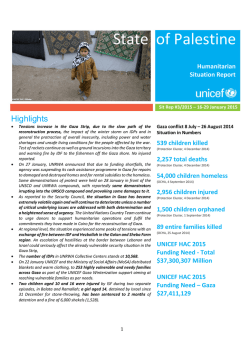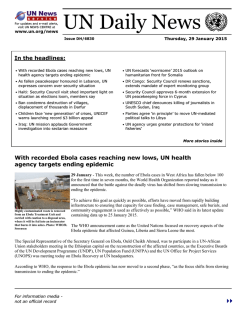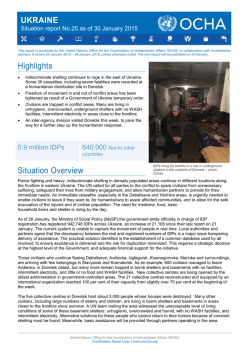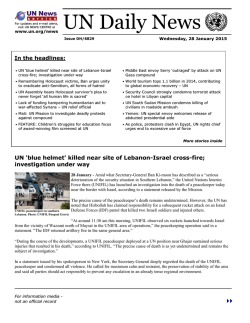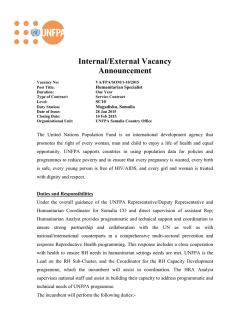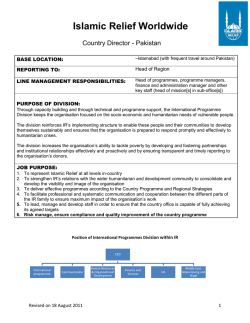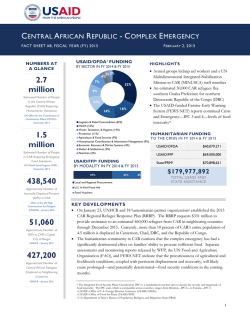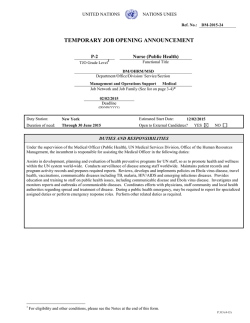
Download - Global Humanitarian Assistance
CRISIS BRIEFING UPDATE: 29 JANUARY 2015 Humanitarian funding analysis: Gaza This briefing paper is an update of the crisis briefing published on 22 October 2014. It focuses primarily on the international humanitarian assistance reported to UN OCHA’s Financial Tracking Service (FTS) and does not capture the totality of funding – both humanitarian and development – that may have been given to Gaza. On UN OCHA’s FTS, there is no specific marker that distinguishes funding for Gaza from funding earmarked for the West Bank. We consider the ‘project title’, ‘description’ and ‘project location’ columns to get an indication of the funding that has been given to Gaza. Figures are correct at time of writing but are subject to frequent change. Updates of funding can be found on the UN OCHA FTS as they become reported to its system. According to the UN Office for the Coordination of Humanitarian Affairs (OCHA)’s Financial Tracking Service (FTS), donors have committed/contributed approximately US$405 million of humanitarian assistance to Gaza since July 2014. Funding has slowed significantly since a peak in monthly funding of US$210 million in August. Only US$29 million has been reported since the Cairo International Conference on Palestine in October. The occupied Palestinian territory (oPt) Strategic Response Plan (SRP) 2014 is 47% funded, with commitments/contributions of US$433 million against a requested amount of US$929 million. No funding to the oPt SRP 2015, which requests US$705 million, has been reported so far in the FTS. Due to a lack of funds, the United Nations Relief and Works Agency (UNRWA) has suspended emergency work on temporary shelter and repairs in Gaza this week. The United States has been the largest donor to Gaza since July (US$95 million), followed by Saudi Arabia (US$80 million). 2. Recent humanitarian funding to Gaza Sixty six donors have committed or contributed approximately US$405 million of humanitarian funding to Gaza since July 2014, with additional pledges of US$77 million. Nearly three-quarters (US$282 million) of the funding provided to Gaza since July 2014 was given in July and August. Only US$29 million of humanitarian assistance has been reported since the Cairo International Conference on Palestine in October. Donors pledged a total of S$5.4 billion in multi-year funding at the conference covering both humanitarian and development interventions including reconstruction. Figure 1: Humanitarian funding to Gaza, since July 2014 US$ millions 1. Key points 300 210 200 100 72 65 33 4 21 Nov-14 Dec-14 0 Jul-14 Aug-14 Sep-14 Oct-14 Total commitment/contribution in US$ millions Source: Development Initiatives based on data from UN OCHA FTS. Data downloaded 27 January 2015. Three donors account for over half of the funding given: the United States (US$95 million; 23%), Saudi Arabia (US$80 million; 20%) and the United Arab Emirates (US$35 million; 9%). While the United States has provided all its sector-specified funding to the food sector, all of Saudi Arabia’s funding has gone to health. Figure 2: Top 10 humanitarian donors to Gaza, since July 2014 US KSA UAE Qatar Charity UK Private Germany Kuwait Australia CERF 95 80 35 28 16 16 15 14 13 11 0 20 40 60 80 Total commitment/contribution in US$ millions Source: Development Initiatives based on data from UN OCHA FTS. Data downloaded 27 January 2015. Note: US, United States; KSA, Kingdom of Saudi Arabia; UAE, United Arab Emirates. 100 2 | Gaza Crisis Briefing Update, 28 January 2015 Figure 4: Humanitarian funding to oPt SRP 2014, by cluster 3. Appeals and response plans UN-coordinated appeals Requirements in the oPt SRP 2014 more than doubled in the course of 2014 to US$929 million following the escalation of humanitarian needs in Gaza. The appeal has received US$433 million so far and is currently 47% funded. This compares to the average of 57% for all UN-coordinated appeals in 2014. The 47% is some 20 percentage points below the average for the previous five oPt UN-consolidated appeals. It represents the first time an oPt UN-coordinated appeal has had less than 50% of its requirements met at the end of a year. Figure 3: Proportion of UN-coordinated oPt appeals met and unmet, 2009–2014 1,000 US$ millions 800 929 805 21% 603 600 45% 400 537 43% 79% 200 53% 420 401 27% 34% Need unmet Needs met 47% 55% 57% 73% 66% 2010 2011 2012 2013 0 2009 2014 Protection, 5.4% Shelter/NFIs, 3% Health & nutrition, 4% WASH, 3% Cluster not yet specified 31% Food security 47% Coordination & support services, 5.2% Education, 2% Source: Development Initiatives based on data from UN OCHA FTS. Data downloaded 27 January 2015. Note: NFIs, non-food items; WASH, water, sanitation and hygiene. The oPt SRP for 2015 was released in December 2014. It requests US$705 million, an increase of US$224 million from the initial requirements of US$391 million identified in the initial oPt SRP 2014. The oPt SRP 2015 targets a total of 1.6 million people, the majority of them in Gaza. Funding requirements are largest for the food security cluster (US$324 million; 46%), followed by shelter and non-food items (NFIs) (US$225 million; 32%). Together these two clusters make up over three quarters of requirements. Figure 5: oPt SRP 2015: Requirements and number of people targeted Source: Development Initiatives based on data from UN OCHA FTS. Data downloaded 27 January 2015. The largest proportion of funding to the oPt SRP 2014 is allocated to the food security cluster (47%; US$204 million). This cluster had the largest requirements in the appeal, accounting for 58% (US$543 million) of total needs identified in the appeal. 31% of funding to the oPt SRP 2014 is not specified to a specific cluster. Source: oPt SRP 2015. 3 | Gaza Crisis Briefing Update, 28 January 2015 No funding to the oPt SRP 2015 has been reported in the FTS so far. The European Emergency Disaster Response Information System (EDRIS), managed by the European Commission's Humanitarian Aid and Civil Protection department (ECHO), shows that US$4.3 million/EUR3.8 million worth of commitments has been provided to oPt by ECHO in the past week, though none of this funding was for the oPt SRP 2015. Other pooled funds Red Cross and Red Crescent Movement Appeals 5. Development assistance to the oPt The International Committee of the Red Cross (ICRC) global appeal for 2015 requests US$56 million/CHF50.5 million for activities in Israel and oPt. This makes it the seventh largest ICRC operation in 2015. Beyond humanitarian assistance, oPt receives a significant amount of development assistance from donors. These represent resources that can support a boarder response to the situation in Gaza, beyond meeting essential humanitarian needs. 4. Pooled funding as part of the response Donors reporting to the International Aid Transparency Initiative (IATI) gave a total of US$1.4 billion of international assistance – capturing both humanitarian and development assistance – to oPt in 2014. The largest donor was the European Union who provided US$441 million, followed by Germany (US$292 million). i Central Emergency Response Fund (CERF) US$461 million of CERF funding has been allocated globally in 2014, US$11 million of which has been disbursed in the oPt from CERF’s rapid response window between 11 and 26 September 2014. This places the oPt 15th out of 45 countries receiving CERF funding that year. Just under 50% (US$5 million) of the CERF funding for oPt in 2014 has been allocated to food distribution projects; the remaining funding has gone to water and sanitation, protection and health interventions. oPt has not received any CERF funding in 2015 so far. Only Libya has received funding through the CERF’s rapid response window in 2015 and oPt is not one of the humanitarian crises to receive assistance through CERF’s first round of funding to support underfunded emergencies in 2015. ii Emergency Response Fund (ERF) The ERF in oPt disbursed a total of US$9.1 million to Gaza in 2014, representing twothirds of total funding disbursed to oPt in 2014. Food security projects received the largest proportion of funding (32%; US$2.9 million), followed closely by water, sanitation and hygiene interventions (25%; US$2.3 million)1. 13% of all ERF funding for Gaza in 2014 reported on FTS has gone to UN agencies (United Nations Development Programme, US$499,000; and UNRWA, US$250,000) – the remaining proportion has gone to non-governmental organisations. There are no other humanitarian country-based pooled funds in oPt. A Palestinian Reform and Development Plan Trust Fund, a multi-donor budget support mechanism administered by the World Bank, has recently transferred US$31.6 million to oPt in support of economic reforms and the humanitarian response in Gaza. Figure 6: Top 10 donors reporting international assistance to oPt, 2014 European Union Germany United Kingdom UNDP WFP Sweden Austrailia UNICEF Netherlands UN-Habitat 441 292 177 79 77 66 50 37 32 21 0 100 200 300 Total disbursed in US$ millions 400 Source: Development Initiatives based on d-portal and IATI data. Data downloaded 28 January 2015. Note: UNDP, United Nations Development Programme; WFP, World Food Programme. 6. Humanitarian funding trends to Gaza (historic) 500 4 | Gaza Crisis Briefing Update, 28 January 2015 While the Kingdom of Saudi Arabia has contributed significantly to the humanitarian response in Gaza, the country has not traditionally been a major humanitarian donor there. It provided US$14 million of humanitarian assistance to Gaza in 2012 and 2013, which pales in comparison to their recent contribution of US$80 million. The top donors to the oPt between 2012 and 2013 were the US (US$337million), the European Commission (US$98 million), and Japan (US$76 million). Figure 7: Top 10 humanitarian donors to oPt, 2012–2013 US$ millions 400 337 300 200 100 98 76 59 50 49 43 39 30 27 0 Total commitment/contribution in US$ millions Source: Development Initiatives based on data from UN OCHA FTS. Data downloaded 27 January 2015. Note: US, United States; EC, European Commission. References 1 UN OCHA, Emergency Response Fund for oPt monthly update, December 2014: http://www.ochaopt.org/documents/hrf_2014_december_monthly_update_report1. pdf Author: Deepak Sardiwal Contact: [email protected] Web: www.globalhumanitarianassistance.org
© Copyright 2026
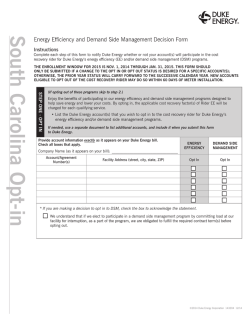
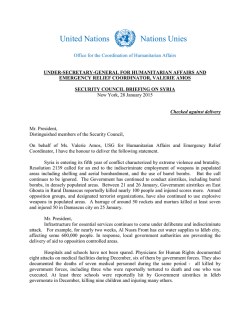
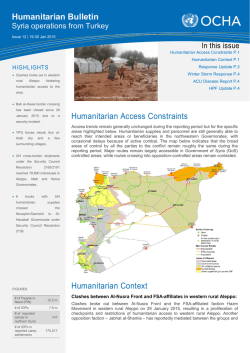
![Current appeal [PDF]](http://s2.esdocs.com/store/data/000456387_1-84443a4282546a8fcd8c29f2bdd10a65-250x500.png)
